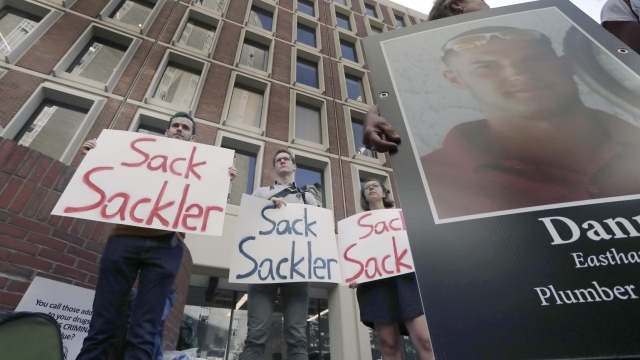The Supreme Court is taking up a potentially landmark case Monday involving Purdue Pharma and the Sackler family.
Oral arguments will be heard on Monday in a rare bankruptcy case for the court.
The Sacklers controlled the pharmaceutical company during the height of the opioid epidemic and have agreed to pay $6 billion in exchange for protection from any future lawsuits.
However, that protection is being challenged by some and could impact how quickly the bankruptcy funds flow to communities who need it.
Victims opposed
For Donna Mazurek, talking about the death of her daughter Paige never gets easier. Paige died from a heroin overdose in 2015, a culmination, she says, of an addiction battle that began when Paige was first prescribed opioids for pain after going to the dentist years earlier.
"It really doesn't matter what they died from. It matters what they became addicted to," Donna Mazurek said.
Mazurek places blame on Purdue Pharma and the Sackler family for her daughter's death.
The Sacklers controlled Purdue for decades and while they have never admitted any wrongdoing, the family has agreed to pay $6 billion to fight addiction as part of Purdue Pharma's ongoing bankruptcy case.
Mazurek is one of only a few dozen people who have publicly confronted the Sacklers in court. She was permitted by a judge to speak to them in a bankruptcy proceeding last year.
"They gave me five minutes to say how I lost a lifetime with my daughter Paige," Mazurek said.
"I told them, they murdered my child," Mazurek added.
The case
That brings us to Monday at the Supreme Court, where justices are hearing oral arguments in Harrington v. Purdue Pharma.
It's a rare bankruptcy case for the court.
At issue is whether the Sacklers should be given what is known as "third-party release" in exchange for giving $6 billion to help victims and communities still battling addiction.
A third-party release would protect the Sacklers from future lawsuits.
The Department of Justice asked the high court to review that earlier this year after a federal bankruptcy trustee questioned the Sacklers' protection.
Mazurek believes that accountability should never be stopped.
"I would rather see them have all their money taken away," Mazurek added.
Victims in support
However, many other victims of opioid abuse disagree, believing that if the Supreme Court rejects this bankruptcy deal it will delay much-needed funds to communities battling addiction.
In a brief filed with the court on behalf of 60,000 victims, attorneys wrote to the court:
"These funds, which the Sackler Family members are providing in exchange for releases, are critically needed now. The opioid epidemic continues to wreak havoc in the United States."
The brief added that some families who would receive checks "live on the edge of poverty."
How the Supreme Court rules in the coming months will impact how quickly and potentially how much victims and communities of the opioid epidemic will receive from this agreement. Not to mention, the ruling will also impact the future of so-called "third-party releases" in other bankruptcy cases too.
Trending stories at Scrippsnews.com



